Unethical Behaviour Against Muslims
VerifiedAdded on 2023/01/10
|6
|1291
|82
AI Summary
This study presents information regarding the various problems faced by Muslim communities based on various ethical and philosophical thought processes. It discusses the issues of stereotyping and discrimination faced by Muslims due to terrorism and provides insights from consequentialist, deontological, virtue, natural law, and care ethics perspectives.
Contribute Materials
Your contribution can guide someone’s learning journey. Share your
documents today.
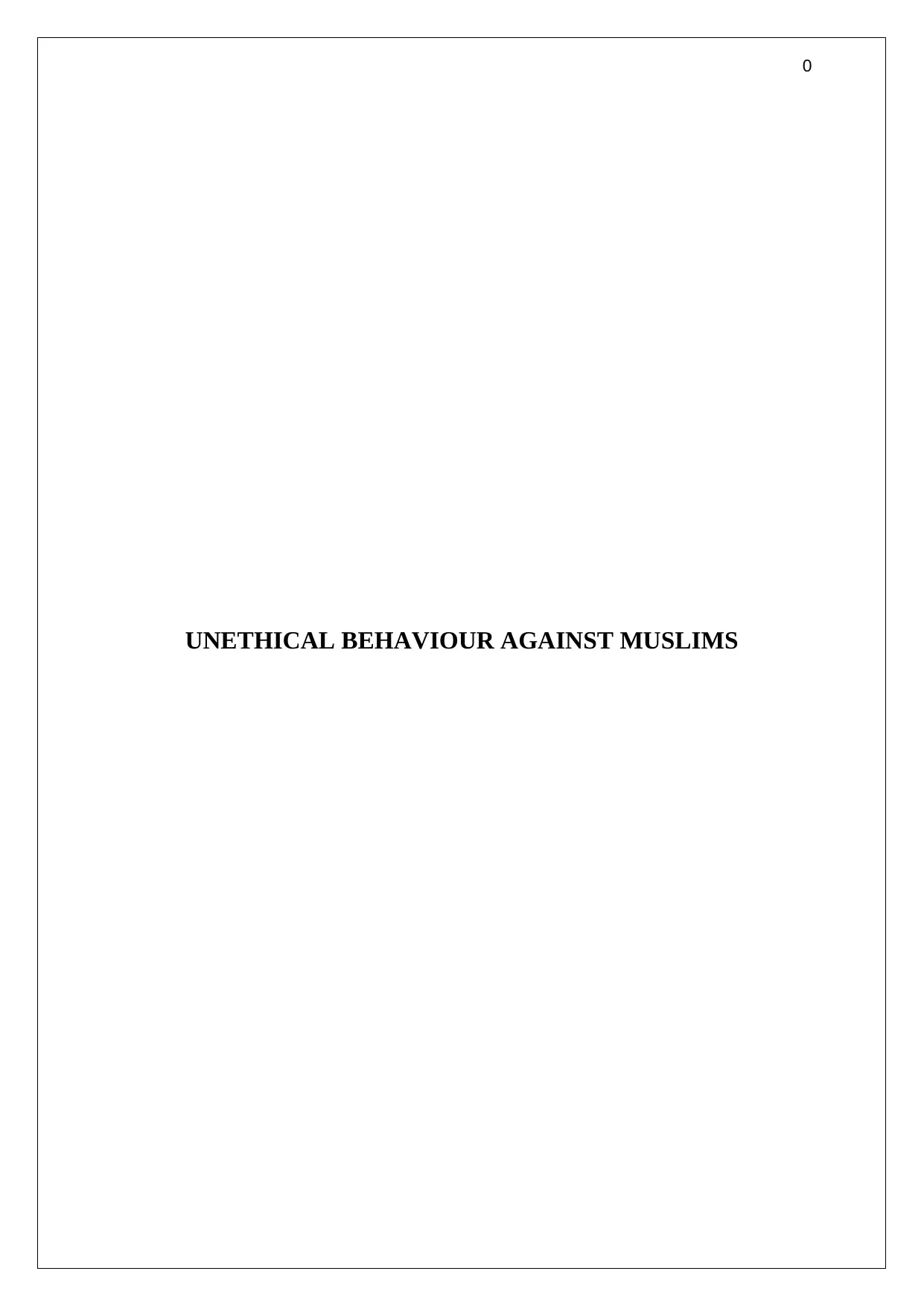
0
UNETHICAL BEHAVIOUR AGAINST MUSLIMS
UNETHICAL BEHAVIOUR AGAINST MUSLIMS
Secure Best Marks with AI Grader
Need help grading? Try our AI Grader for instant feedback on your assignments.
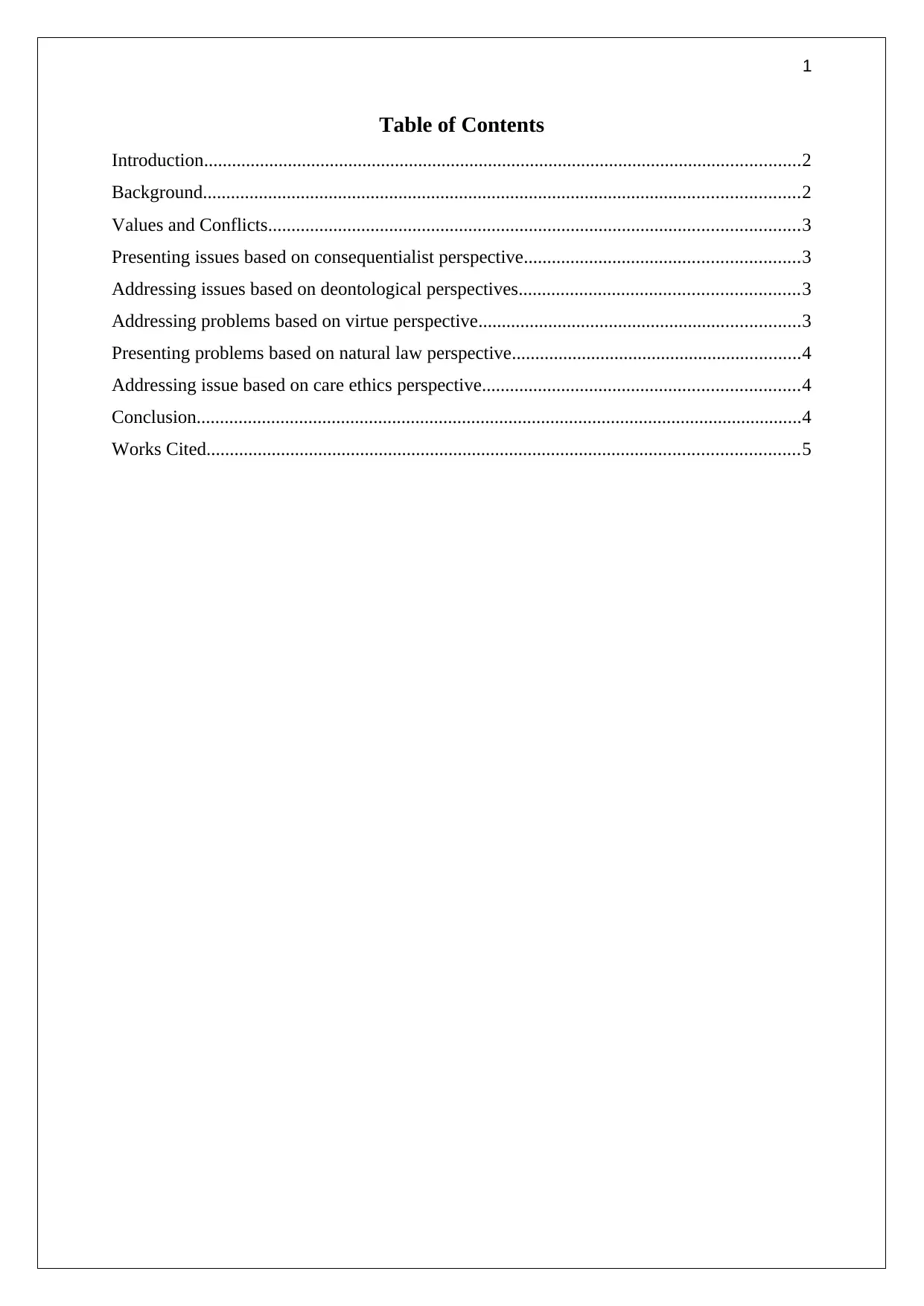
1
Table of Contents
Introduction................................................................................................................................2
Background................................................................................................................................2
Values and Conflicts..................................................................................................................3
Presenting issues based on consequentialist perspective...........................................................3
Addressing issues based on deontological perspectives............................................................3
Addressing problems based on virtue perspective.....................................................................3
Presenting problems based on natural law perspective..............................................................4
Addressing issue based on care ethics perspective....................................................................4
Conclusion..................................................................................................................................4
Works Cited...............................................................................................................................5
Table of Contents
Introduction................................................................................................................................2
Background................................................................................................................................2
Values and Conflicts..................................................................................................................3
Presenting issues based on consequentialist perspective...........................................................3
Addressing issues based on deontological perspectives............................................................3
Addressing problems based on virtue perspective.....................................................................3
Presenting problems based on natural law perspective..............................................................4
Addressing issue based on care ethics perspective....................................................................4
Conclusion..................................................................................................................................4
Works Cited...............................................................................................................................5
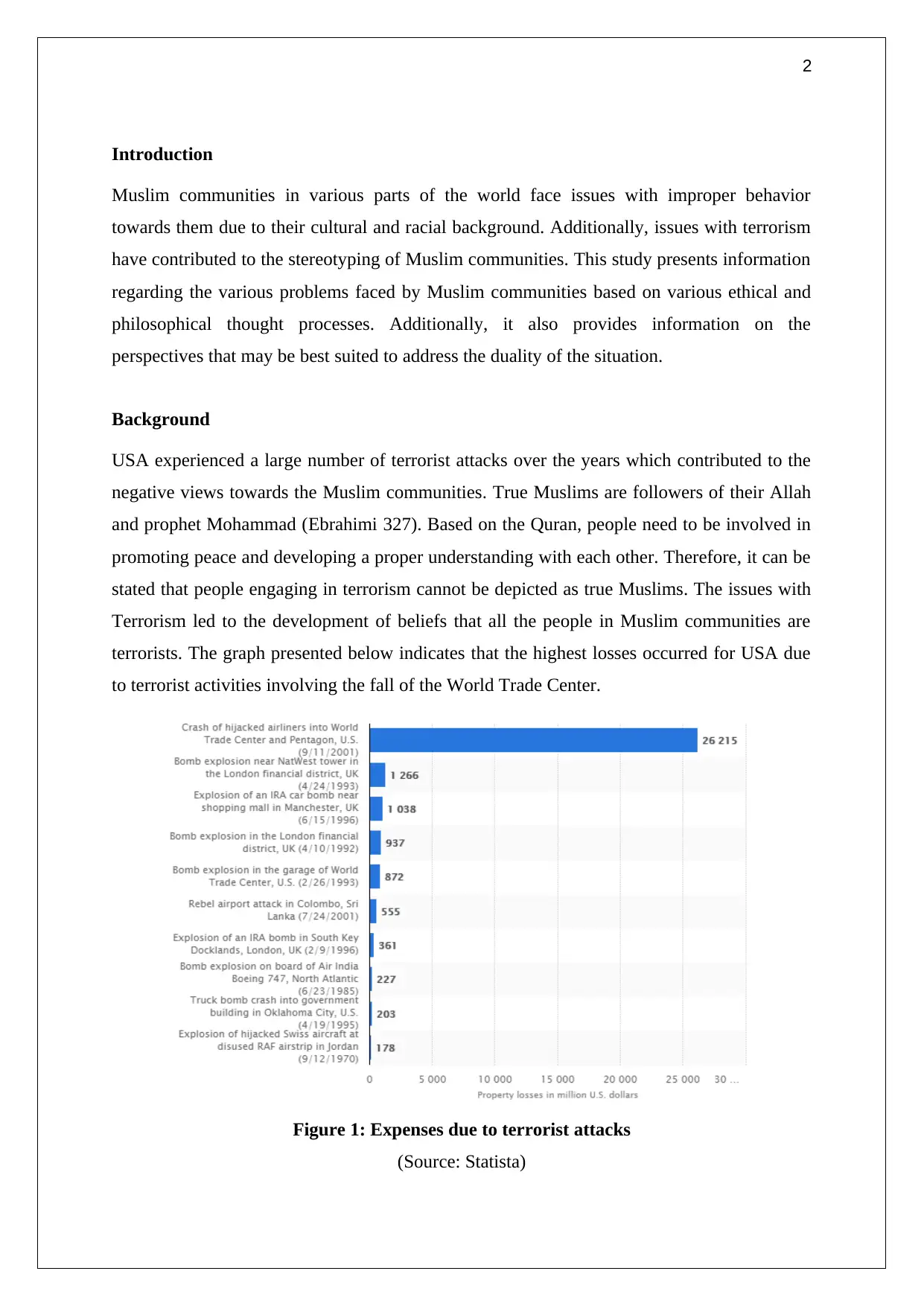
2
Introduction
Muslim communities in various parts of the world face issues with improper behavior
towards them due to their cultural and racial background. Additionally, issues with terrorism
have contributed to the stereotyping of Muslim communities. This study presents information
regarding the various problems faced by Muslim communities based on various ethical and
philosophical thought processes. Additionally, it also provides information on the
perspectives that may be best suited to address the duality of the situation.
Background
USA experienced a large number of terrorist attacks over the years which contributed to the
negative views towards the Muslim communities. True Muslims are followers of their Allah
and prophet Mohammad (Ebrahimi 327). Based on the Quran, people need to be involved in
promoting peace and developing a proper understanding with each other. Therefore, it can be
stated that people engaging in terrorism cannot be depicted as true Muslims. The issues with
Terrorism led to the development of beliefs that all the people in Muslim communities are
terrorists. The graph presented below indicates that the highest losses occurred for USA due
to terrorist activities involving the fall of the World Trade Center.
Figure 1: Expenses due to terrorist attacks
(Source: Statista)
Introduction
Muslim communities in various parts of the world face issues with improper behavior
towards them due to their cultural and racial background. Additionally, issues with terrorism
have contributed to the stereotyping of Muslim communities. This study presents information
regarding the various problems faced by Muslim communities based on various ethical and
philosophical thought processes. Additionally, it also provides information on the
perspectives that may be best suited to address the duality of the situation.
Background
USA experienced a large number of terrorist attacks over the years which contributed to the
negative views towards the Muslim communities. True Muslims are followers of their Allah
and prophet Mohammad (Ebrahimi 327). Based on the Quran, people need to be involved in
promoting peace and developing a proper understanding with each other. Therefore, it can be
stated that people engaging in terrorism cannot be depicted as true Muslims. The issues with
Terrorism led to the development of beliefs that all the people in Muslim communities are
terrorists. The graph presented below indicates that the highest losses occurred for USA due
to terrorist activities involving the fall of the World Trade Center.
Figure 1: Expenses due to terrorist attacks
(Source: Statista)
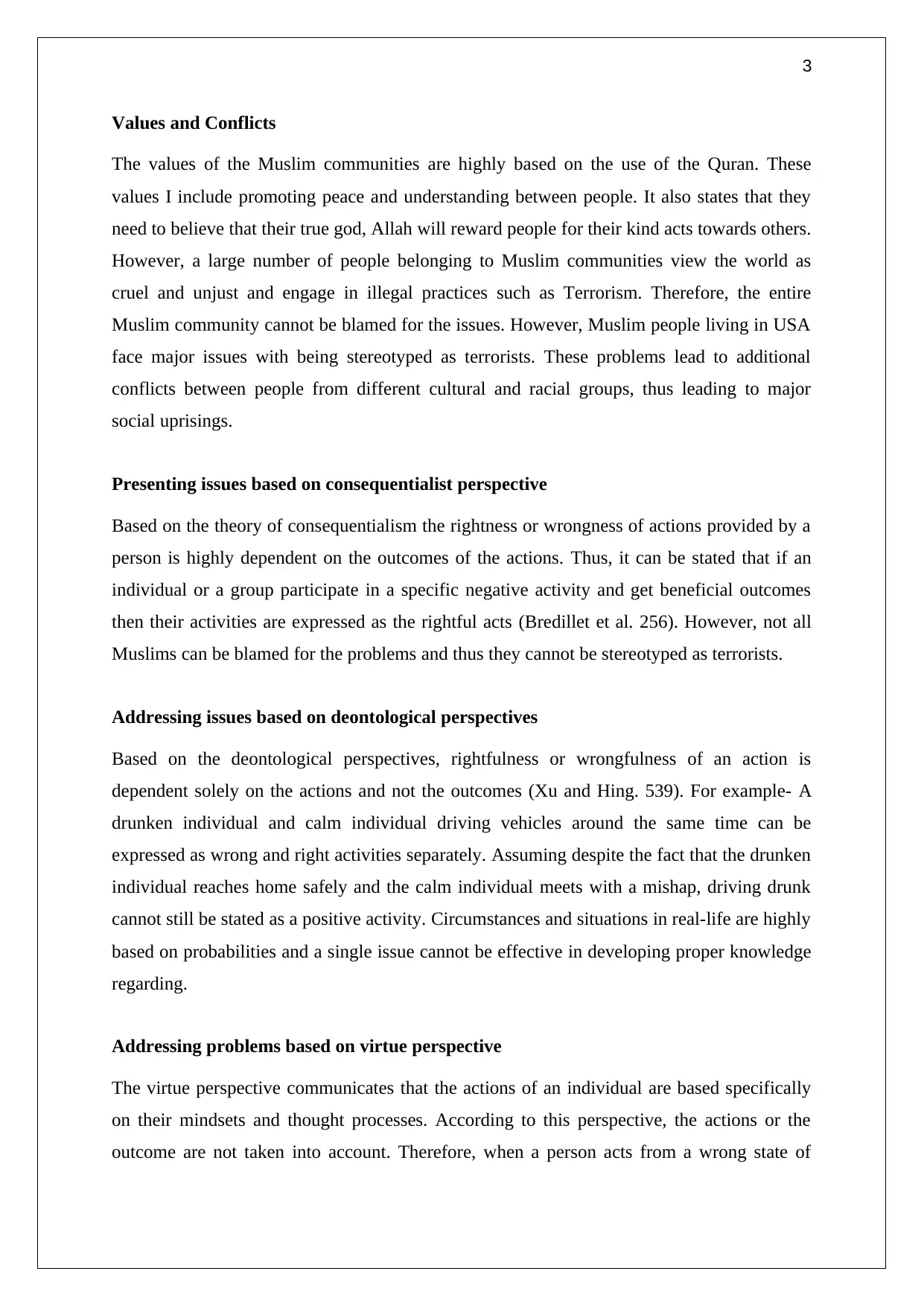
3
Values and Conflicts
The values of the Muslim communities are highly based on the use of the Quran. These
values I include promoting peace and understanding between people. It also states that they
need to believe that their true god, Allah will reward people for their kind acts towards others.
However, a large number of people belonging to Muslim communities view the world as
cruel and unjust and engage in illegal practices such as Terrorism. Therefore, the entire
Muslim community cannot be blamed for the issues. However, Muslim people living in USA
face major issues with being stereotyped as terrorists. These problems lead to additional
conflicts between people from different cultural and racial groups, thus leading to major
social uprisings.
Presenting issues based on consequentialist perspective
Based on the theory of consequentialism the rightness or wrongness of actions provided by a
person is highly dependent on the outcomes of the actions. Thus, it can be stated that if an
individual or a group participate in a specific negative activity and get beneficial outcomes
then their activities are expressed as the rightful acts (Bredillet et al. 256). However, not all
Muslims can be blamed for the problems and thus they cannot be stereotyped as terrorists.
Addressing issues based on deontological perspectives
Based on the deontological perspectives, rightfulness or wrongfulness of an action is
dependent solely on the actions and not the outcomes (Xu and Hing. 539). For example- A
drunken individual and calm individual driving vehicles around the same time can be
expressed as wrong and right activities separately. Assuming despite the fact that the drunken
individual reaches home safely and the calm individual meets with a mishap, driving drunk
cannot still be stated as a positive activity. Circumstances and situations in real-life are highly
based on probabilities and a single issue cannot be effective in developing proper knowledge
regarding.
Addressing problems based on virtue perspective
The virtue perspective communicates that the actions of an individual are based specifically
on their mindsets and thought processes. According to this perspective, the actions or the
outcome are not taken into account. Therefore, when a person acts from a wrong state of
Values and Conflicts
The values of the Muslim communities are highly based on the use of the Quran. These
values I include promoting peace and understanding between people. It also states that they
need to believe that their true god, Allah will reward people for their kind acts towards others.
However, a large number of people belonging to Muslim communities view the world as
cruel and unjust and engage in illegal practices such as Terrorism. Therefore, the entire
Muslim community cannot be blamed for the issues. However, Muslim people living in USA
face major issues with being stereotyped as terrorists. These problems lead to additional
conflicts between people from different cultural and racial groups, thus leading to major
social uprisings.
Presenting issues based on consequentialist perspective
Based on the theory of consequentialism the rightness or wrongness of actions provided by a
person is highly dependent on the outcomes of the actions. Thus, it can be stated that if an
individual or a group participate in a specific negative activity and get beneficial outcomes
then their activities are expressed as the rightful acts (Bredillet et al. 256). However, not all
Muslims can be blamed for the problems and thus they cannot be stereotyped as terrorists.
Addressing issues based on deontological perspectives
Based on the deontological perspectives, rightfulness or wrongfulness of an action is
dependent solely on the actions and not the outcomes (Xu and Hing. 539). For example- A
drunken individual and calm individual driving vehicles around the same time can be
expressed as wrong and right activities separately. Assuming despite the fact that the drunken
individual reaches home safely and the calm individual meets with a mishap, driving drunk
cannot still be stated as a positive activity. Circumstances and situations in real-life are highly
based on probabilities and a single issue cannot be effective in developing proper knowledge
regarding.
Addressing problems based on virtue perspective
The virtue perspective communicates that the actions of an individual are based specifically
on their mindsets and thought processes. According to this perspective, the actions or the
outcome are not taken into account. Therefore, when a person acts from a wrong state of
Secure Best Marks with AI Grader
Need help grading? Try our AI Grader for instant feedback on your assignments.
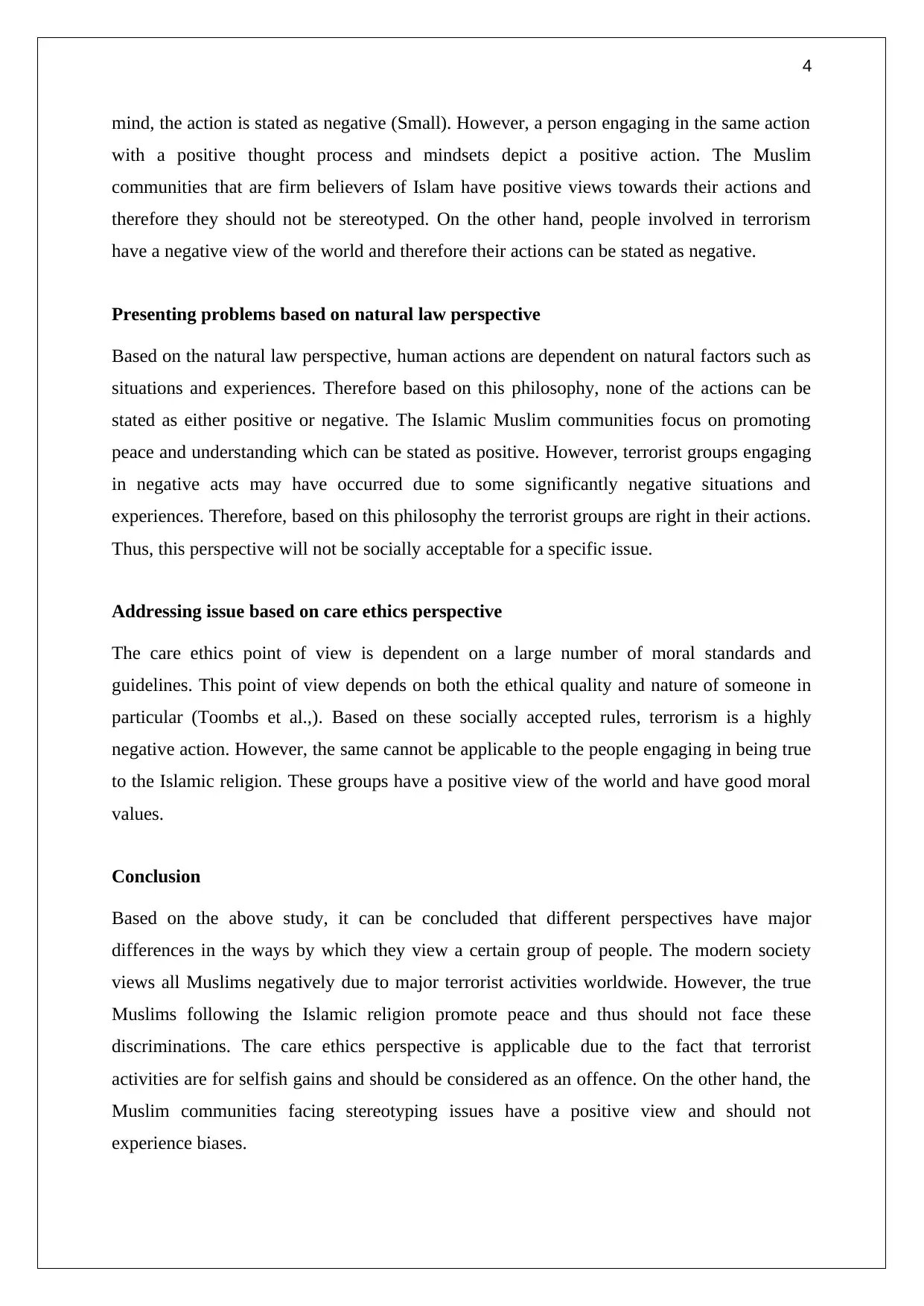
4
mind, the action is stated as negative (Small). However, a person engaging in the same action
with a positive thought process and mindsets depict a positive action. The Muslim
communities that are firm believers of Islam have positive views towards their actions and
therefore they should not be stereotyped. On the other hand, people involved in terrorism
have a negative view of the world and therefore their actions can be stated as negative.
Presenting problems based on natural law perspective
Based on the natural law perspective, human actions are dependent on natural factors such as
situations and experiences. Therefore based on this philosophy, none of the actions can be
stated as either positive or negative. The Islamic Muslim communities focus on promoting
peace and understanding which can be stated as positive. However, terrorist groups engaging
in negative acts may have occurred due to some significantly negative situations and
experiences. Therefore, based on this philosophy the terrorist groups are right in their actions.
Thus, this perspective will not be socially acceptable for a specific issue.
Addressing issue based on care ethics perspective
The care ethics point of view is dependent on a large number of moral standards and
guidelines. This point of view depends on both the ethical quality and nature of someone in
particular (Toombs et al.,). Based on these socially accepted rules, terrorism is a highly
negative action. However, the same cannot be applicable to the people engaging in being true
to the Islamic religion. These groups have a positive view of the world and have good moral
values.
Conclusion
Based on the above study, it can be concluded that different perspectives have major
differences in the ways by which they view a certain group of people. The modern society
views all Muslims negatively due to major terrorist activities worldwide. However, the true
Muslims following the Islamic religion promote peace and thus should not face these
discriminations. The care ethics perspective is applicable due to the fact that terrorist
activities are for selfish gains and should be considered as an offence. On the other hand, the
Muslim communities facing stereotyping issues have a positive view and should not
experience biases.
mind, the action is stated as negative (Small). However, a person engaging in the same action
with a positive thought process and mindsets depict a positive action. The Muslim
communities that are firm believers of Islam have positive views towards their actions and
therefore they should not be stereotyped. On the other hand, people involved in terrorism
have a negative view of the world and therefore their actions can be stated as negative.
Presenting problems based on natural law perspective
Based on the natural law perspective, human actions are dependent on natural factors such as
situations and experiences. Therefore based on this philosophy, none of the actions can be
stated as either positive or negative. The Islamic Muslim communities focus on promoting
peace and understanding which can be stated as positive. However, terrorist groups engaging
in negative acts may have occurred due to some significantly negative situations and
experiences. Therefore, based on this philosophy the terrorist groups are right in their actions.
Thus, this perspective will not be socially acceptable for a specific issue.
Addressing issue based on care ethics perspective
The care ethics point of view is dependent on a large number of moral standards and
guidelines. This point of view depends on both the ethical quality and nature of someone in
particular (Toombs et al.,). Based on these socially accepted rules, terrorism is a highly
negative action. However, the same cannot be applicable to the people engaging in being true
to the Islamic religion. These groups have a positive view of the world and have good moral
values.
Conclusion
Based on the above study, it can be concluded that different perspectives have major
differences in the ways by which they view a certain group of people. The modern society
views all Muslims negatively due to major terrorist activities worldwide. However, the true
Muslims following the Islamic religion promote peace and thus should not face these
discriminations. The care ethics perspective is applicable due to the fact that terrorist
activities are for selfish gains and should be considered as an offence. On the other hand, the
Muslim communities facing stereotyping issues have a positive view and should not
experience biases.
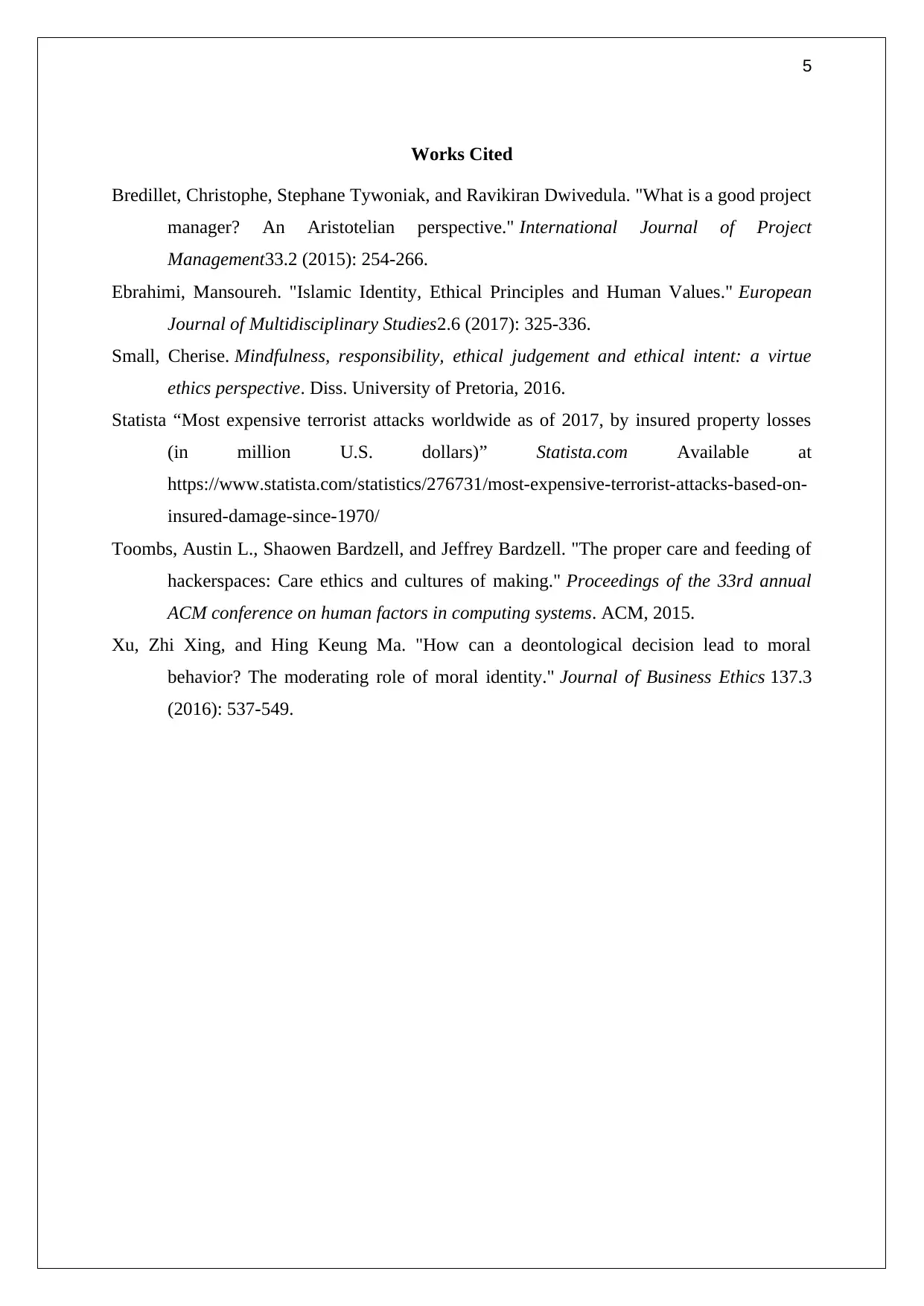
5
Works Cited
Bredillet, Christophe, Stephane Tywoniak, and Ravikiran Dwivedula. "What is a good project
manager? An Aristotelian perspective." International Journal of Project
Management33.2 (2015): 254-266.
Ebrahimi, Mansoureh. "Islamic Identity, Ethical Principles and Human Values." European
Journal of Multidisciplinary Studies2.6 (2017): 325-336.
Small, Cherise. Mindfulness, responsibility, ethical judgement and ethical intent: a virtue
ethics perspective. Diss. University of Pretoria, 2016.
Statista “Most expensive terrorist attacks worldwide as of 2017, by insured property losses
(in million U.S. dollars)” Statista.com Available at
https://www.statista.com/statistics/276731/most-expensive-terrorist-attacks-based-on-
insured-damage-since-1970/
Toombs, Austin L., Shaowen Bardzell, and Jeffrey Bardzell. "The proper care and feeding of
hackerspaces: Care ethics and cultures of making." Proceedings of the 33rd annual
ACM conference on human factors in computing systems. ACM, 2015.
Xu, Zhi Xing, and Hing Keung Ma. "How can a deontological decision lead to moral
behavior? The moderating role of moral identity." Journal of Business Ethics 137.3
(2016): 537-549.
Works Cited
Bredillet, Christophe, Stephane Tywoniak, and Ravikiran Dwivedula. "What is a good project
manager? An Aristotelian perspective." International Journal of Project
Management33.2 (2015): 254-266.
Ebrahimi, Mansoureh. "Islamic Identity, Ethical Principles and Human Values." European
Journal of Multidisciplinary Studies2.6 (2017): 325-336.
Small, Cherise. Mindfulness, responsibility, ethical judgement and ethical intent: a virtue
ethics perspective. Diss. University of Pretoria, 2016.
Statista “Most expensive terrorist attacks worldwide as of 2017, by insured property losses
(in million U.S. dollars)” Statista.com Available at
https://www.statista.com/statistics/276731/most-expensive-terrorist-attacks-based-on-
insured-damage-since-1970/
Toombs, Austin L., Shaowen Bardzell, and Jeffrey Bardzell. "The proper care and feeding of
hackerspaces: Care ethics and cultures of making." Proceedings of the 33rd annual
ACM conference on human factors in computing systems. ACM, 2015.
Xu, Zhi Xing, and Hing Keung Ma. "How can a deontological decision lead to moral
behavior? The moderating role of moral identity." Journal of Business Ethics 137.3
(2016): 537-549.
1 out of 6
Your All-in-One AI-Powered Toolkit for Academic Success.
+13062052269
info@desklib.com
Available 24*7 on WhatsApp / Email
![[object Object]](/_next/static/media/star-bottom.7253800d.svg)
Unlock your academic potential
© 2024 | Zucol Services PVT LTD | All rights reserved.